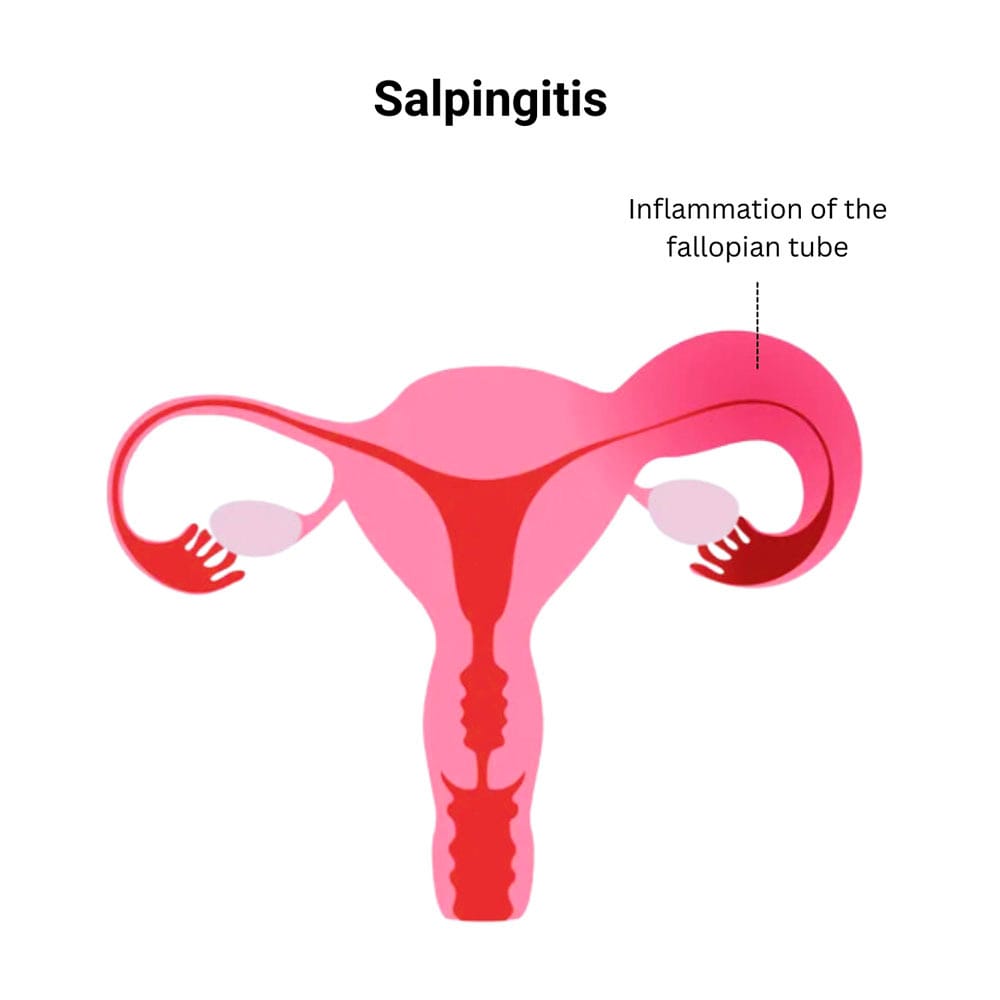What Is Salpingitis?
 Salpingitis is an infection and inflammation of the fallopian tubes, which can impact your reproductive system. Fallopian tubes connect your ovaries to your uterus and your eggs pass through these tubes during ovulation. Your fallopian tubes may become blocked or scarred and prevent an egg from reaching your uterus, which leads to fertility problems or complications like ectopic pregnancy. Don’t wait to address your fallopian tube pain, chronic or acute salpingitis or other female health conditions. With the right care, you can get back to living life fully. In New York City, Dr. Felix Cohen and his team at Cohen Medical Practice (CMP) have the expertise and experience to successfully treat complicated conditions like tuberculous salpingitis, which is an infection that started with a lesion in your intestines or lungs and moved to your reproductive organs.
Salpingitis is an infection and inflammation of the fallopian tubes, which can impact your reproductive system. Fallopian tubes connect your ovaries to your uterus and your eggs pass through these tubes during ovulation. Your fallopian tubes may become blocked or scarred and prevent an egg from reaching your uterus, which leads to fertility problems or complications like ectopic pregnancy. Don’t wait to address your fallopian tube pain, chronic or acute salpingitis or other female health conditions. With the right care, you can get back to living life fully. In New York City, Dr. Felix Cohen and his team at Cohen Medical Practice (CMP) have the expertise and experience to successfully treat complicated conditions like tuberculous salpingitis, which is an infection that started with a lesion in your intestines or lungs and moved to your reproductive organs.
What Are the Symptoms of Salpingitis?
You may experience pelvic pain often on both sides of your lower abdomen. Pain can range from mild to severe, depending on how advanced the infection is. Unusual vaginal discharge, especially if it’s heavy, foul smelling or has a yellow or green color, is a red flag. This discharge is your body’s response to the infection in your fallopian tubes. Not every woman with this condition experiences noticeable symptoms.
But when symptoms are present, you may also experience:
- Low-grade fever
- Uncomfortable or painful sex
- Disruptions in your menstrual cycle
- Burning sensation while urinating
Experiencing pain in your lower back is also common, which could be connected to the inflammation and pressure in your pelvic area. You could also feel nauseous or even vomit, especially if salpingitis progressed to a more severe case.
Salpingitis is a type of pelvic inflammatory disease (PID) that usually results from sexually transmitted diseases (STDs) such as:
- Chlamydia. You may not have any symptoms, but chlamydia can silently cause damage if not treated.
- Gonorrhea. This bacterium can inflame and scar your fallopian tubes.
- Non-STD infections. Infections like bacterial vaginosis or pelvic infections can get into your reproductive system and cause fallopian tube pain.
How Is Salpingitis Diagnosed?
Your CMP doctor checks your medical history and talks to you about how long you’ve had symptoms. If you’ve had any previous gynecological problems, your doctor may be able to figure out if you’re at risk for STDs. It’s tough to find out if your fallopian tubes are blocked since they regularly open and close. They might look closed when they’re blocked.
To diagnose blocked fallopian tubes, your doctor may recommend three main tests, including:
- Ultrasound or sonogram. This test uses sound waves to create images of your fallopian tubes. It helps your doctor spot any blockages or fluid buildup.
- Hysterosalpingogram (HSG). This is an x-ray test where a dye is injected into your uterus. If the dye doesn’t flow into your fallopian tubes, it could show if there are blockages or swelling.
- Laparoscopy. Your doctor uses a tiny camera through a small cut in your abdomen to see your fallopian tubes.
You may also get blood tests to look for a high number of white blood cells, which can indicate an infection. Your doctor may use your medical history to help diagnose your condition. if you’ve had a burst appendix before and are now having trouble getting pregnant, it might point to blocked fallopian tubes as a possible cause.
What Treatment Options Can Help Me Manage Salpingitis?
Initially, your doctor recommends a specific antibiotic, or a combination of antibiotics based on the type of bacteria causing your condition. If you have a mild case of salpingitis, your doctor may prescribe oral antibiotics for you to take at home and use for one to two weeks. You may need IV antibiotics that go straight into your bloodstream in severe cases.
This stronger treatment is often done in the hospital to quickly manage infections like tuberculous salpingitis and prevent serious complications like chronic salpingitis or chronic pain.
Other treatments for salpingitis include:
- Treating your partner if the infection is an STD
- Draining fallopian tube abscesses
- Repairing scars or adhesions surgically to protect your fertility
- Removing your ovaries if you present with both chronic salpingitis and oophoritis, which is an infection of your ovaries
What Can I Expect during My Recovery from Salpingitis or Oophoritis?
Resting and staying hydrated are crucial to support your body’s recovery and fight infections. Avoid strenuous activities; your doctor schedules follow-up appointments to check on your recovery and may perform additional tests if needed.
Listen to your doctor’s advice for maintaining good reproductive health to avoid future complications of acute salpingitis such as:
- Practicing safe sex
- Getting regular gynecological check-ups
- Addressing any health issues that could contribute to infections
With years of experience in feminine health and gynecological surgery, Dr. Cohen and his team are dedicated to providing personalized treatment, from antibiotic therapies to surgical interventions. From thorough evaluations to effective treatments of salpingitis and oophoritis, they help you regain control of your reproductive health. Contact Cohen Medical Practice (CMP) in Midtown NYC now to learn more about your treatment options.

